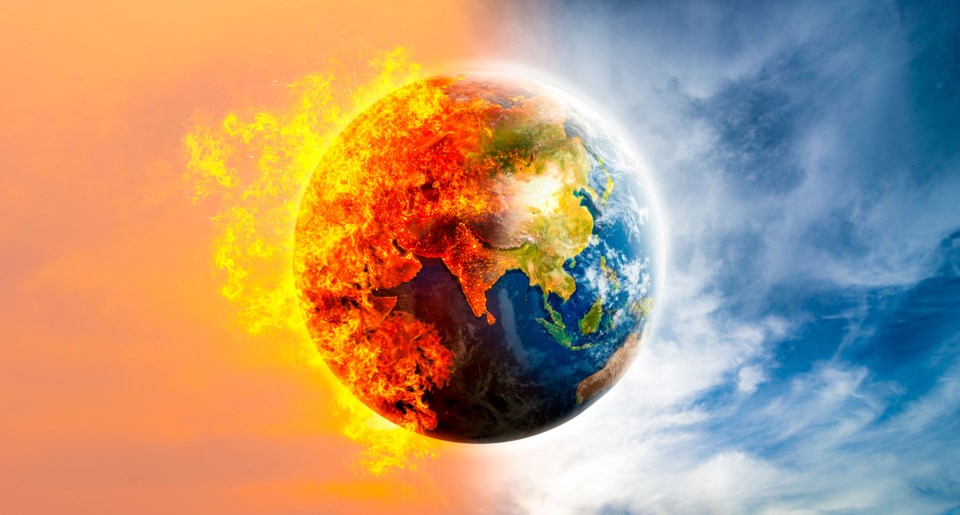Historically, industrialized countries and large corporations have been the biggest emitters of greenhouse gases.
However, the consequences of these emissions are felt strongest by smaller communities.
In the summer of 2021; wildfires ravaged the Interior of B.C., burning hundreds of thousands of hectares of forest and wiping out the town of Lytton.This and the heat dome that led to the disaster was just one of a string of climate-related catastrophes in recent years. This year, Europe saw its worst drought in 500 years, and floods engulfed Pakistan, displacing millions of people. Over 1,700 human lives were lost to those floods.
Prompted by extreme weather events around the world, a United Nations report looked at ways to reduce the risk of natural disasters caused by man-made climate change. The report concluded that although the large-scale industries and global policies bear the biggest responsibility, a community-focused, grassroots-driven climate action plan is needed.
The solution, a study notes, is community-based adaptation (CBA) to climate change. That's a process based on local priorities and on climate change models, seasonal forecasts and trends derived from data collected at local weather stations.
And as world leaders gather for the COP27 global summit in Egypt from Nov. 6 to 18, that community-focused approach has taken centre stage for Simon Fraser University's (SFU) official delegation at the conference.
"Climate change is a global issue," says Dugan O'Neil, SFU's vice-president of research and international. "A complex global issue, [but] the effects of climate change are local."
O'Neil explained that the measures to lower a community's carbon footprint differ across communities, so having a "cookie-cutter" approach to climate might result in missing some crucial differences, speaking to the need for a community-focus climate action plan.
Community-focused adaptation, according to O'Neil, involves listening to people in the community, to understand their needs and devise solutions to help lower the greenhouse gas emissions of that community — in a way that's sustainable and economically viable for local residents.
CARE Climate Justice Centre's Adaptation Learning Plan suggests that community-based disaster risk reduction (DRR) and early warning systems (EWS) systems enable enable the best outcomes for individual towns, cities and regions..
O'Neil believes that a deep engagement with the community — neighbourhood by neighbourhood — is needed to understand what the underlying issues in the area are and what can be done about them.
"If we go into community, we listen and then try to find a solution that fits the needs of that community, it's going to be a lot more successful than going in and banging on the table and saying, 'Change... and change in the following way."
O'Neil added that a lot of organizations and local governments have begun to adopt a community-focused approach to climate action.
Local initiatives
SFU has long prioritized climate resiliency, and the City of Burnaby is taking community-focused climate action to tackle the crisis at a local level.
The Urban Resilient Futures Initiative, a product of the SFU-city Civic Innovation Lab partnership for climate action, aims to overcome barriers to climate action by engaging the community to set priorities to accelerate Burnaby toward a zero-carbon future.
O'Neil noted that the city wants to hear from the community and has initiatives in place to facilitate that.
"[The city] wants the community to work alongside them to figure out how to be a better city, how to be a more climate-resilient city," he said. "And for the folks in Burnaby, being aware and and being engaged in things like urban resilient future would be something that could be done that could make a real difference to the way Burnaby decides to move forward."
The city initiative is part of a broad effort among communities to play a part in fighting climate change, which is getting help from non-profits. Among them, a charity called Ecotrust Canada has been working with rural, remote and Indigenous communities in Canada toward building an economy that provides for a healthy and resilient natural environment.
The charity focuses on developing locally led solutions to climate change, with a focus on job creation and protection of environmental, social and cultural values.
For instance, Ecotrust Canada's Cheakamus Community Forest project has ensured that all communities involved benefit from the sale of carbon offsets to the B.C. government, businesses and individuals, the project report noted.
In United States, a project called 'Hyperlocalism: Transforming the Paradigm for Climate Adaptation (HyLo)' brought together residents from two Florida communities to share their stories of how intense heat and flooding brought on by climate change have impacted their daily lives — and to develop ways of reducing harm from climate change, putting the instrument of change in the residents' hands.
Hope for the future
A key part of COP27 discussions is managing global temperatures — according to the Paris Agreement signed in 2015 — to limit the rise below 1.5C.
Incorporating initiatives at a community level can be a key element as countries move forward with community-based adaptation to climate change, O'Neil said. "This is great... coming together of different types of expertise, different approaches to solving the same problem alongside community members."
He added, "I'm optimistic that we can actually do something at the community level that makes a difference."




